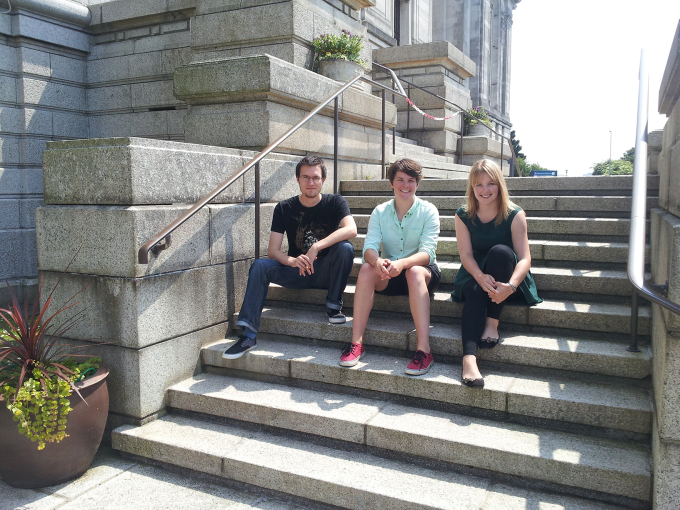Postgraduate Studies

Postgraduate Opportunities at the Centre
Welsh And Celtic Postgraduate Studies
About CAWCS
The Centre for Advanced Welsh and Celtic Studies (CAWCS) was established by the University of Wales in 1985 as a dedicated research centre for the languages, literatures, culture and history of Wales and the other Celtic countries.
CAWCS is located in Aberystwyth, alongside the National Library of Wales, an internationally-renowned copyright library housing an unmatched collection of Welsh manuscripts and archives. It is also home to Geiriadur Prifysgol Cymru, the standard historical dictionary of the Welsh language.
We offer postgraduate research degrees (MPhil and PhD) in the fields of Welsh Studies and Celtic Studies, through the medium of English or Welsh. Our students are supervised by leading scholars, and work alongside postdoctoral fellows in a supportive environment with excellent research facilities. We are part of the University of Wales Trinity St David (UWTSD) and our degrees are awarded by UWTSD.
Current PhD students
Douglas Ewart – The Tweed and Cleddau: a comparative study of the cultural histories of communities living within the catchments of two British rivers.
Supervisors: Mary-Ann Constantine & Elizabeth Edwards
Megan Farr – Putting Cymru on the Map: Strategic Action for Internationalising the Children’s Publishing Sector in Wales.
Supervisors: Elin Haf Gruffydd Jones & Alexandra Büchler
Colin Fisher – Concepts of a Roman Identity – Romanitas in Wales from Roman Britain to the Medieval Era.
Supervisors: David Parsons & Rhys Kaminski-Jones
Zhiping Li – Translating Chinese Classics: A Study of Chinese Translators’ Adaptative Strategies in the Age of Cultural Globalization from a Bourdieusian Perspective.
Supervisors: Thomas Jansen & Elin Haf Gruffydd Jones
Catrin Llwyd – I ba raddau mae cynhyrchu cynnwys cyfryngol Cymraeg yn cyfrannu at greu amgylchiadau ieithyddol cadarnhaol neu ‘ofodau anadlu’ (cf Fishman, 1991) i gynyddu defnydd a chryfhau hunaniaeth ieithyddol. Ffocws ar bobl ifanc Sir Gaerfyrddin.
Supervisors: Elin Haf Gruffydd Jones & Christine Jones
Daniel Konttori – ‘The other Celtic countries’ – Are Germany, Austria and Switzerland not Celtic?
Supervisors: John Koch & Rhys Kaminski-Jones
Elliot MacMillan – Richard Gough in Wales: the intellectual production of eighteenth-century antiquarian travel.
Supervisors: Mary-Ann Constantine & Rhys Kaminski-Jones
Jeanne Mehan – Lives of the Welsh saints in Nicholas Roscarrock’s unpublished manuscript now known as Cambridge, Cambridge University Library, MS Additional 3041(C).
Supervisors: Jenny Day & Jane Cartwright
Mark Rees – The Gothic Gaze: dark perceptions and representations of Wales and the Welsh in the visual culture of the long nineteenth century.
Supervisors: Elizabeth Edwards & Martin Crampin
Sally Sadler – The life, works and legacy of Richard Fenton, Pembrokeshire antiquarian.
Supervisors: Mary-Ann Constantine & Elizabeth Edwards
Lisa Spooner – The folklore of West Cornwall: an analysis of collections, publications, and adaptations from the eighteenth to twenty-first centuries, focussed on the works of William Bottrell and Robert Hunt (published 1865-81).
Supervisors: Mary-Ann Constantine & Elizabeth Edwards
Patricia Taylor – Healing Waters: an analysis of evolving medicinal, traditional, commemorative and other uses of wells associated with St Cybi in Wales and Cornwall.
Supervisors: Jane Cartwright, Martin Crampin & Mary-Ann Constantine
Fees & how to apply
Applicants for MPhil/PhD study are expected to have a first or upper second class degree (or equivalent) in a related discipline.
The first step in applying to study at CAWCS is to find a prospective supervisor. Your supervisor will advise and support your studies throughout your time at CAWCS, ensuring that your MPhil/PhD thesis develops to its full potential and that it meets required standards. Browse our staff profiles to find a member of staff in your subject area, and feel free to e-mail them directly to discuss possible PhD topics – they will be happy to help.
The next step is to put together a research proposal – a 500- to 1000-word overview of the questions and issues you wish to explore in your thesis. To discuss further how we can help you to develop your research ideas, and for initial guidance on the admissions process, contact our Head of Postgraduate Studies. You can also find further guidance and advice relating to the application process here.
For annual fees for MPhil/PhD registration, see here.
Studying in Aberystwyth
Aberystwyth is a lively coastal town with a big student population, overlooking Cardigan Bay and set in beautiful countryside. Beachside walks are likely to become a regular part of your life here. The Cambrian Mountains and Snowdonia National Park are both within easy reach, allowing you to enjoy outdoor pursuits from rock climbing to sea kayaking.
The town is rich in bars, restaurants, and cafés, and has a buzzing cultural calendar, with regular live music, comedy, theatre, cinema, and dance. Deep within the ‘Fro Gymraeg [Welsh-speaking Wales]’ and with an active Welsh-speaking cultural scene, it is perfect for learning or polishing your skills in the widest-spoken Celtic language in the world! The town has good road and public transport links, with regular trains from Aberystwyth to England and the north Wales coast. Aberystwyth combines the secluded pleasures of the country with the cosmopolitan stimulation of a university town – and CAWCS staff and students are a vital part of that mix.
Sources of funding
Loans for postgraduate study are now available.
The James Pantyfedwen Foundation awards grants on a competitive basis to Welsh students for postgraduate study.
The Coleg Cymraeg Cenedlaethol awards Research Scholarships on a competitive basis for Welsh-language doctoral study.
